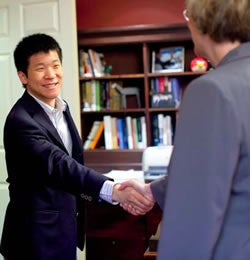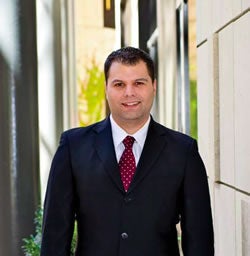Two alumni entrepreneurs, two new ventures
Entrepreneurs, as management guru Peter Drucker has written, “create something new, something different; they change or transmute values.” That’s not easy to do, as two Harvard Law grads—one just embarking on a new startup, the other working to build a business he developed—can attest. But they also can speak to the excitement of seeing a need and seeking to fill it, and doing it in a way that has never been done before.
For Ben Longoria ’03, the idea started, as it often does with him, when he tried to make things more efficient. As an associate with Fenwick & West handling mergers and acquisitions, he had to oversee the review of hundreds, sometimes even thousands, of documents to facilitate a deal. Much of the process had to be done by calling or emailing someone and waiting for their reply. It was cumbersome and frustrating, he said, and forced him to devote most of his time to administrative work instead of legal analysis.
“Every other associate in my firm and every firm had the exact same problem,” said Longoria. “It was just that I decided to do something about it.”
Aiding his search for a solution was his longtime passion for technology, nurtured by his single mother, who bought him a Commodore 64 computer when he was 5 years old. While at the firm, he started programming in his spare time, which culminated in an application that digitized and automated the corporate transaction process.
At the same time, his career was progressing at Fenwick & West. His job was stable, the money was good, and he was on a path that would be considered a dream for many young attorneys. And yet, he couldn’t shake the thought that he should give it all up to start his own company.
“When you get an idea to invent something, it’s like a nagging bug”
Ben Longoria
He left in 2008 to start Wizdocs to offer products that help lawyers manage diligence reviews in M&A transactions as well as organize general legal documents. He now spends much of his time pitching the products to firms, bolstered by his experience as an attorney. The challenge, he said, is that the legal market can be resistant to innovation and reluctant to change (indeed, he quips that the last technological breakthrough at many firms was email). Oftentimes it’s clients wanting law firms to meet a budget who help drive his business because they are—like him—focused on efficiency.
That focus was evident when Longoria was a student at HLS. Working for the Office of Career Services, he found that it offered no materials online and scheduled appointments via a paper binder. He worked with the then new head of Career Services Mark Weber to automate the office, freeing up counselors and staff to spend more time serving students.
“Ben was instrumental in making a shift in our office in how we did business,” said Weber. “He looks where there is a problem and asks how he can make it better.”

Patrick Ho ’12 also saw a problem to solve, though it’s not one he or most people in the West experience personally. It began in the fall of 2011, when he took a class at Harvard Business School and was given an assignment to devise a commercial plan for a scientific technology. He and three classmates chose an invention by two Tufts professors designed to stabilize vaccines in silk-based materials, allowing them to be viable at high temperatures and eliminating the need for refrigeration, which is often lacking in poor parts of the world. The self-described “science geek,” who studied physics in college, gravitated toward the idea of changing society through scientific discovery.
“We have what we call a double bottom-line business,” said Ho. “We have something we think could be sustainable as a business and profitable; at the same time we’re really excited about the global health aspects, about the increase in access to vaccines that could potentially result.”
When the class ended, their desire to pursue the plan continued, driven by a sense of camaraderie and a common purpose. Their belief in the concept was reinforced when they won the Harvard University President’s Challenge for social entrepreneurship, which came with a $70,000 grant for the company they are calling Vaxess Technologies (in addition, they also won the Harvard Business School Business Plan Contest). Ho will oversee licensing and regulatory affairs, a complex responsibility because of the medical and international aspects of the company. It’s a daunting challenge for someone who just graduated from law school, he acknowledged. But he is grateful for the chance to start something new in a company that could make a difference to people across the world.
“For me, it was a tremendous stroke of luck in my third year of law school to happen upon something that brought all my interests together,” Ho said.
